Shadows over Camelot
Authors: Serge Laget & Bruno Cathala
Publisher: Days of Wonder
Year: 2005
review by

| x |
|
|
|
|
|
|
|
|
|
|
|
|
|
|
|
|
|
|
|
|
|
|
|
|
|
|
|
|
|
|
|
|
|
|
|
|
|
|
|
|
|
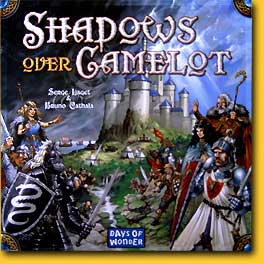 |
Shadows over Camelot is a game in the rare category of cooperative games. As Knights of the Round Table all players are invited to fight the evil that will start spreading from several directions into poor King Arthur’s kingdom. The goal is to save the kingdom from defeat. However, there is also a possibility that a traitor is among the knights, fighting on the evil side, who will try to make the knights lives a living hell.
With this game, Days of Wonder has set the standard for board game marketing. A dedicated website was launched, revealing the details of the game piece by piece. At a later stage the rules were published together with a forum, where soon the first impressions were posted. The hype was built-up carefully. The question to be answered is whether the game itself has lived up to this hype.
|
| x |
|
|
|
|
|
|
|
|
|
|
|
|
|
|
|
|
|
|
|
|
|
|
|
|
|
|
|
|
|
|
|
|
|
|
|
|
|
|
|
|
|
| The game consists of a number of small games within the Camelot setting, games that we could call, depending on our imagination, quests, assignments or just plain card games. Depending on the difficulty of the quest the knights can gain a number of white or black swords, which are laid on the round table, together with any other obtained swords. If the total of swords exceeds twelve, the game ends. |
|
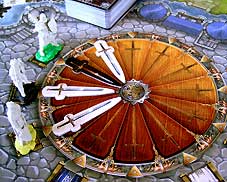 |
| x |
|
|
|
|
|
|
|
|
|
|
|
|
|
|
|
|
|
|
|
|
|
|
|
|
|
|
|
|
|
|
|
|
|
|
|
|
|
|
|
|
|
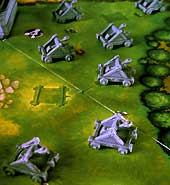 |
|
The knights have won when the majority of swords is white. If not, the evil has won, possibility led by the traitor among the knights. If the traitor has not been revealed during the game, another two white swords are turned black.
To make things worse, Camelot is also under siege during the game, and a total of twelve siege engines will also end the game in favour of the evil side. |
| x |
|
|
|
|
|
|
|
|
|
|
|
|
|
|
|
|
|
|
|
|
|
|
|
|
|
|
|
|
|
|
|
|
|
|
|
|
|
|
|
|
|
At the beginning of the game each player is dealt a knight’s character: Koning Arthur, Sir Galahad, Sir Gawain, Sir Kay, Sir Palamedes, Sir Percival or Sir Tristan. Each knight obtains an equipment consisting of a unique special power, a total of four lives (indicated by a die), and six white cards. These white cards are required by each knight to perform his good deeds.
|
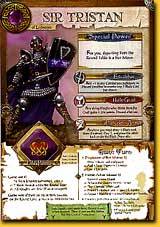 |
| x |
|
|
|
|
|
|
|
|
|
|
|
|
|
|
|
|
|
|
|
|
|
|
|
|
|
|
|
|
|
|
|
|
|
|
|
|
|
|
|
|
|
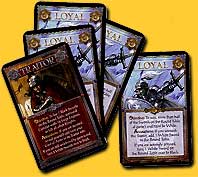 |
However, before the knights go off on their mission each knight is secretly dealt a loyality card, indicating whether the knight is loyal or a traitor. There are eight such loyalty cards, dealt to a maximum of seven players. The remaining cards are returned to the box, without being looked at. With a lower number of players, the probability of a traitor among the knights becomes smaller, since the eight loyalty cards are always used. |
| x |
|
|
|
|
|
|
|
|
|
|
|
|
|
|
|
|
|
|
|
|
|
|
|
|
|
|
|
|
|
|
|
|
|
|
|
|
|
|
|
|
|
|
Sir Lancelot: We were in the nick of time. You were in great peril.
Sir Galahad: I don't think I was.
Sir Lancelot: Yes, you were. You were in terrible peril.
Sir Galahad: Look, let me go back in there and face the peril.
Sir Lancelot: No, it's too perilous.
Sir Galahad: Look, it's my duty as a knight to sample as much peril as I can.
Sir Lancelot: No, we've got to find the Holy Grail. Come on.
Sir Galahad: Oh, let me have just a little bit of peril?
Sir Lancelot: No. It's unhealthy.
|
|
|
|
|
|
|
|
|
|
|
|
|
|
|
|
|
|
| x |
|
|
|
|
|
|
|
|
|
|
|
|
|
|
|
|
|
|
|
|
|
|
|
|
|
|
|
|
|
|
|
|
|
|
|
|
|
|
|
|
|
 |
|
|
|
|
|
|
|
|
|
|
|
|
|
|
|
|
|
|
|
|
|
|
|
|
|
|
|
|
|
|
|
|
|
|
|
|
|
 |
|
|
|
|
|
|
|
|
|
|
|
|
|
|
|
|
|
|
|
|
|
|
|
|
|
|
|
|
|
|
|
|
|
|
|
|
|
 |
|
|
|
|
|
|
|
|
|
|
|
|
|
|
|
|
|
|
|
|
|
|
|
|
|
|
|
|
|
|
|
|
|
|
|
|
|
| x |
|
|
|
|
|
|
|
|
|
|
|
|
|
|
|
|
|
|
|
|
|
|
|
|
|
|
|
|
|
|
|
|
|
|
|
|
|
|
|
|
|
 |
|
|
|
|
|
|
|
|
|
|
|
|
|
|
|
|
|
|
|
|
|
|
|
|
|
|
|
|
|
 |
|
|
|
|
|
|
|
|
|
|
|
|
|
|
|
|
|
|
|
|
|
|
|
|
|
|
|
|
|
|
|